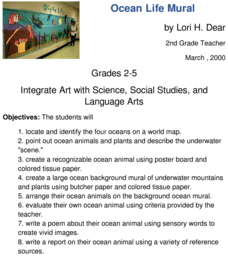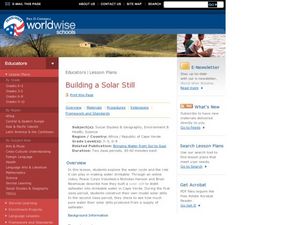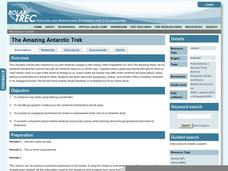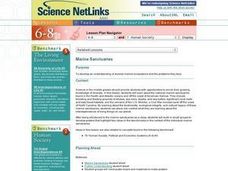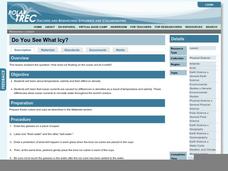Curated OER
Hypothermia on the High Seas
Students identify and present the effects on humans when the body temperature falls, demonstrate and explain how the body loses heat, and understand hypothermia and cold water survival techniques.
Curated OER
Miller-Urey Experiment Amino Acids & The Origins of Life on Earth
Young scholars study the Miller-Urey Experiment including its history and criticism. In this origins of life lesson students repeat this experiment to see how it works.
Curated OER
A Long Way from Home: A Hands-on Geography Lesson about World War II
Pupils build World War II directional signs. In this World War II lesson, students explore the geographic locations of the war as they analyze primary sources and conduct research regarding places of significance in the war. Pupils...
Curated OER
Lesson Plan on Latitude and Longitude
Sixth graders identify at least ten places on the world map using given longitude and latitude points. They identify the longitude and latitude of ten places on the world map.
Curated OER
Day Eight Lesson- The Whale Rider
Students examine cultural differences through the reading of The Whale Rider by Witi Ihimaera. In this language arts lesson plan, students work in groups to analyze chapters 11 and 12 of the novel; these chapters highlight cultural...
Curated OER
Interpreting Oceans of Data
Sixth graders analyze the data from a scientific experiment. In this statistics activity, 6th graders answer questions about some data to show their understanding of the data. They apply the result to future decisions when using data.
Curated OER
Should We Hunt the Largest Animals on the Planet?
Students discover details about whaling. In this environmental stewardship instructional activity, students research selected websites to locate information about commercial whaling and its implications.
Curated OER
Lights On ! Lights Off! Exploring Human Settlement Patterns
Third graders write informational paragraphs based on the settlement patterns of the United States. In this settlement lesson plan, 3rd graders read about population and how it affects where people settle next.
Curated OER
Come on In- the Water's Fine
Students examine how coastal erosion effects seaside communities. They investigate how people have to make choices when manipulate the physical environment such as when dredging and constructing seawalls in coastal areas. They complete a...
Curated OER
Oily Oceans
Students, after reading Jack, the Seal and the Sea, by Gerald Aschenbrenner, get a hands-on knowledge of the effects of oil on water, and those things that come in contact with it.
Curated OER
Ocean Life Mural
How many oceans can you name? First, have learners try to name as many oceans as they can, and then have them locate and identify the oceans on a world map. They create a recognizable ocean animal using poster board and tissue paper....
Curated OER
Building A Solar Still
Students investigate the water cycle by viewing an online video. In this drinking water lesson, students create solar stills at their campus in order to purify water that is tainted. Students view a video on their computers about...
Polar Trec
The Amazing Antarctic Trek
This resource provides two ways to engage learners in using latitude, longitude, and research skills. In pairs, or on their own, learners will locate several Antarctic regions on a map. They will write the name of the place and a few key...
Teach Engineering
Get the Word Out at McDonald's!
To get the word out that the Great Pacific garbage patch (GPGP) contains millions of pounds of non-biodegrading plastics, individuals research the GPGP and write an article for a newsletter. Researchers present their facts in a way that...
Curated OER
Marine Sanctuaries
Middle schoolers delve into diverse marine ecosystems and the problems they face. They discover students the national marine sanctuaries found in the Pacific and Atlantic oceans and off the coast of American Samoa.
Curated OER
Dance: Water Dancing
Examine the way water moves, drips, and splashes with an expressive dance. Learners discuss the ways in which water moves, then create dance sequences that show or describe water. There are several suggestions to adapt this lesson plan...
Curated OER
Coral Bleaching in the Caribbean
Students practice analyzing images, maps and graphs from Internet-based educational resources. They explore the correlation between sea surface temperature and coral bleaching. Students comprehend that coral reefs are collections of tiny...
Curated OER
Ocean Exploration: Shapes and Patterns Under the Sea
So many shapes in our vast oceans. Young explorers can discover new shapes in a variety of ways in this lesson. One way is having free exploration with a pattern shape kit handed out by the teacher. Another is by viewing a video, Ocean...
Curated OER
Hurricanes As Heat Engines
Students examine sea surface temperatures to see how hurricanes get heat from the oceans surface. In this hurricanes instructional activity students use the Internet to find data and make line plots.
Curated OER
Renewable vs. Non-Renewable Resources
Fifth graders are introduced to the important topic of renewable, and non-renewable, resources. They are expected to be able to correctly categorize different types of resources as renewable or non-renewable. Another emphasis of this...
Curated OER
Dry Season and 'Green' Season in Costa Rica
Students explore the seasonal changes in Costa Rica. In this dry season lesson students use the Internet to locate science data then generate data for precipitation.
California Academy of Science
Climate Change Impacts
Getting kids thinking about climate change now, will hopefully push them into action when they become adults. Young environmentalists discuss the evidence and causes of climate change seen in the state of California. They brainstorm ways...
Polar Trec
Do You See What Icy?
Here is a instructional activity that kicks off with a question. "How does ice floating on the ocean act as it melts?" As learners investigate this natural phenomenon, they'll discover that it has a lot to do with temperature, salinity,...
Curated OER
Earth's Water: A drop in your cup
Students complete activities where they observe the amount of freshwater in the world as a fraction of the actual amount of water using different mixtures. For this freshwater lesson plan, students brainstorm on how to preserve freshwater.
Other popular searches
- Math Lessons on Oceans
- Pre K Lessons on Oceans
- Prue K Lessons on Oceans
- Drama Lessons on Oceans
- Pr K Lessons on Oceans












